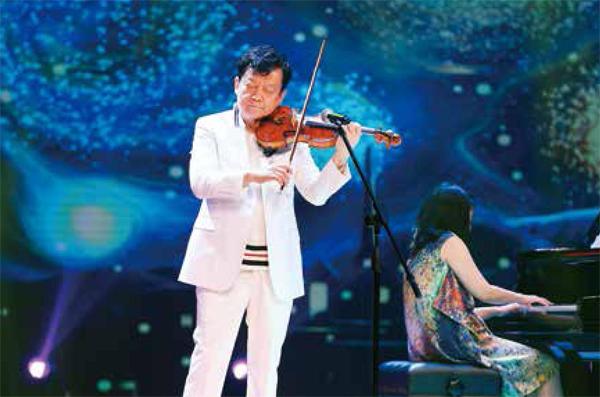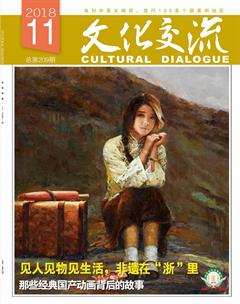怀念著名小提琴家盛中国一曲“梁祝”成绝响
孙国维
9月7日,著名小提琴家、《梁祝》的演奏者盛中国因心脏病突发抢救无效去世,享年77岁。
盛中国是中国第一批享誉世界的演奏家之一。几十年来,他多次应邀到亚洲、欧洲、大洋洲、南美洲许多国家举办独奏音乐会,并多次与国内外交响乐团和世界著名指挥、音乐家同台演出巴赫、莫扎特、贝多芬等的名曲。澳大利亚ABC广播公司,甚至将盛中国列入“世界最伟大的艺术家”的行列。
笔者与盛中国相知相识于40多年前,回忆起往日点滴,感慨不已。
一对琴瑟和鸣的佳偶
9月13日上午,盛中国的告别仪式在八宝山殡仪馆东礼堂举行。笔者在现场看到不少业界知名音乐家前来送行,包括著名作曲家赵季平、中国交响乐团首席指挥李心草、钢琴家鲍蕙荞和刘诗昆等。
追思会没有播放哀乐,现场只播放了一首柴可夫斯基的《D大调小提琴协奏曲》,到场送别父亲的盛洁说:“这是我父亲盛中国在1980年应邀到澳大利亚悉尼歌剧院演出时录下的。”追思会几乎自始至终播放着那首缠绵悱恻、凄美动人的小提琴协奏曲《梁祝》,这是盛中国生前最爱演奏的乐曲,纵然千万遍而不厌倦,那是他的代表作,也是他与濑田裕子的定情曲。
在告别仪式的最后,盛中国的夫人濑田裕子走到大师的遗体旁,将一把盛中国心爱的小提琴放到他的身上,并把他生前穿戴过的大衣和眼镜也放到他身上。她说:“我怕他冷,会看不清楚。”然后,她又低下头去对盛中国说:“我永远爱你,我们下辈子再做夫妻。”这番真情话语让在场的亲友都无不动容。
笔者认识濑田裕子是在多年前的古巴。那天,笔者与古巴朋友洽谈商务,恰巧对门房间里遇见久未谋面的老朋友盛中国。他正好因为古巴邻居养狗的事要与他商量,却因语言不通无法沟通,见了我就像碰上了救星似的。我俩热烈拥抱,互致问候。我帮他们解决了相互间的矛盾。盛中国邀请我到他家做客。这时,我才认识他的夫人濑田裕子。
盛中国与濑田裕子的爱情故事可谓是一段乐坛佳话。
1986年,第三届国际小提琴比赛在日本举行,盛中国作为中国代表参加并担当评委。比赛结束后,日方希望盛中国留下来举办音乐会。盛中国希望日方为他找个钢琴伴奏。一位朋友向他推荐了小他20岁的濑田裕子。后者在初见盛中国时,刚从日本国立音乐学院毕业不久,已在音乐界小有名气,被称为“会用钢琴唱歌的青年演奏家”。
经过第一次登台合作,双方都有了好感和信任。在日后的交往中,两人的感情慢慢升温。盛中国曾打了个比方,他与濑田裕子的感情发展就像“飞机软着陆”,是一个水到渠成的过程。而其中的奥秘就在于《梁祝》。盛中国耗费心血把梁山伯与祝英台的爱情故事演绎成一部小提琴协奏曲。濑田裕子为盛中国伴奏,不仅需要天赋,更需要盛中国的耐心启发,最重要的其实是爱心。有了爱心,这曲完美的恋人曲当然会成为爱情的催化剂。
1994年,两人正式结为夫妇。盛中国说他与濑田裕子在生活中是情侣,在舞台上是战友。
自从盛中国把《梁祝》改编成小提琴和钢琴协奏曲之后,他与濑田裕子的家庭功课主要就是如何切磋和磨合这首爱情交响曲了。
一位出生于提琴世家的天才
追溯起来,笔者与盛中国相知相识是在40多年前。他在音乐学院的一个宿舍里接受笔者的采访。
那小屋虽然局促,但却整洁。他不仅做得一手好菜,而且还是能工巧匠,家里的沙发就出自他自己的手艺。那时候虽然流行自打家具,但家里自做沙发的为数不多。尽管那时候物资匮乏,然而中午时分,他还特地为我做了一盘红烧平鱼,让我大快朵颐。我们十分投缘,大有酒逢知己千杯少的感觉。也是在那间小屋,盛中国打开话匣子,为笔者介紹了他的提琴世家——
父亲盛雪是音乐学院的小提琴教授,母亲朱冰是女高音歌唱家和钢琴演奏家。全家11个孩子,有9个都拉小提琴,每每弦歌一堂,其乐融融。在南京和两广一带,说起盛氏家族的演出规模和气派,大家都会竖起拇指啧啧惊叹。而这样的成绩背后,少不了苦练。一年中,盛家的孩子唯有年三十和正月初一才能休息,概无例外。但盛中国确实是好样的,不仅琴不离手,曲不离口,而且,音准到位,一丝不苟。夏练三伏,冬练三九,不是汗流浃背,就是手生冻疮。稍有怠慢,父亲就会严厉指出。
严师手下出高徒。盛中国5岁开始随父学琴;7岁登台演出;9岁时武汉人民广播电台录制了由他独奏的莫扎特、贝多芬和舒伯特等大师的经典作品并向全国传播,令无数观众为之倾倒。盛中国被赞为“天才琴童”。
在1956年举办的纪念莫扎特诞辰200周年的音乐会上,他在李德伦指挥的中央乐团管弦乐队伴奏下,演奏了莫扎特的《A大调小提琴协奏曲》。1960年,他与刘诗昆一起赴莫斯科柴可夫斯基音乐学院留学,师从苏联著名小提琴大师列·柯岗。1962年,他参加在莫斯科举办的第三届国际柴可夫斯基小提琴比赛,并获得荣誉奖。回国后,他曾多次应邀到亚洲、欧洲、大洋洲和南美洲的许多国家以及中国港澳地区举办独奏音乐会,足迹遍天下。
盛中国是我国音乐界一位传奇式人物,他对作品的理解和处理有独到之处。演奏风格既热情奔放,又优美细腻;既富于诗情画意,又具有浪漫幻想。1979年,世界级小提琴大师梅纽因来华访问,在北京红塔礼堂与盛中国同台演出时,他赞扬盛中国是他在中国演奏巴赫小提琴协奏曲的最佳拍档。他观察到盛中国的左手指弹跳力快得惊人,这也是为何盛中国在演奏时能做到或如平沙落雁,或如天马行空。
In Memory of Violinist Sheng Zhongguo
By Sun Guowei, our special reporter in Beijing
Renowned Chinese violinist Sheng Zhongguo died of a heart attack in Beijing on September 7, 2018. He was 77 years old.
The news of his death hit me hard. I first met him more than 40 years ago. I went to visit him at a dormitory building at a music school in Beijing. The apartment was small, but orderly. He was a fine cook and fine carpenter. Back then, he made his own sofa. At the end of the interview, he treated me to fish braised in soy sauce he cooked. We drank wine and chatted more. It was during that meeting that I learned about his family. He was born in 1941 to a musical family. His father Sheng Xue was a violinist and professor and his mother was a pianist and vocalist. Of the 11 children, nine played violin. He was the most famous of the familys young nine violinists. His familys violin shows were a concert phenomenon.
At age 7, he gave his first public performance, and two years later he made his first solo recording, with Wuhan People's Broadcasting Station, playing music by Mozart, Beethoven and Schubert.
In 1954, Sheng Zhongguo began studying at the Central Conservatory of Music in Beijing and, in 1960, continued his education at the Tchaikovsky Conservatory in Moscow under the guidance of the great Russian violinist Leonid Kogan. After returning to China in 1964, Sheng gave concerts as a soloist with the China National Symphony Orchestra.
I met his wife Hiroko Seta, a Japanese pianist, in Cuba many years ago. One day I went to visit a friend in Havana at his home, which was in a residential compound. It just happened that Sheng Zhongguo and his wife were living in an apartment across the corridor. When I arrived, I just saw Sheng Zhongguo talking to the neighbor about cats. As he saw me, he was surprised and overjoyed. We hugged each other. Then I interpreted for Sheng. As the problem solved through communications, Sheng invited me to his home where I first met his wife.
Sheng Zhongguo served as juror at the third international violin competition in Japan in 1986. After the competition, Sheng was invited to give solo concerts in Japan. Sheng asked the host to find a pianist for his concerts. A friend recommended Hiroko Seta, a young pianist who had just graduated from a celebrated conservatory of music. Twenty years younger than Sheng, she was a rising pianist who was able to “make the piano sing”.
The bond between the two was firmly established after the first cooperation. The link between them was Butterfly Lovers, a violin concerto composed by He Zhanhao and Chen Gang in 1959, when both were students at the Shanghai Conservatory of Music. Seta and Sheng worked together to find the best violin-piano interpretation of the concerto. The two fell in love. In 1994, they got married.
As a national-level soloist with the China National Symphony Orchestra, Sheng was among the first Chinese musicians to win honors on the international stage with a performance style that was filled with enthusiasm and poetic charm. In 1980, he held 12 concerts in six cities in Australia, making quite a stir there. These performances not only were a landmark for Sino-Australian cultural exchanges, but also marked the official entrance of Chinese violin performances onto international cultural and art stage. Sheng was listed as one of the "world's greatest artists" by the Australian Broadcasting Corporation after his performances in the country.
During his lifetime, Sheng worked with top musicians at home and abroad. In 1979, he performed with world-famous violinist Yehudi Menuhin, after which Menuhin praised Sheng as the best partner to have to play the Bach Double Violin Concerto in China.
I attended Sheng Zhongguos funeral in Beijing. His wife Hiroko Seta placed a pair of glasses and an overcoat by Shengs body. Through out of the funeral, the acoustic system played two musical pieces. One was Violin Concerto in D Major composed by Tchaikovsky. His daughter Sheng Yi said at the funeral that it was a live record of the masterpiece performed by Sheng Zhongguo at a concert in Australia in 1980. The other was Butterfly Lovers, a recording jointly made by Sheng Zhongguo and his wife Hiroko Seta.

